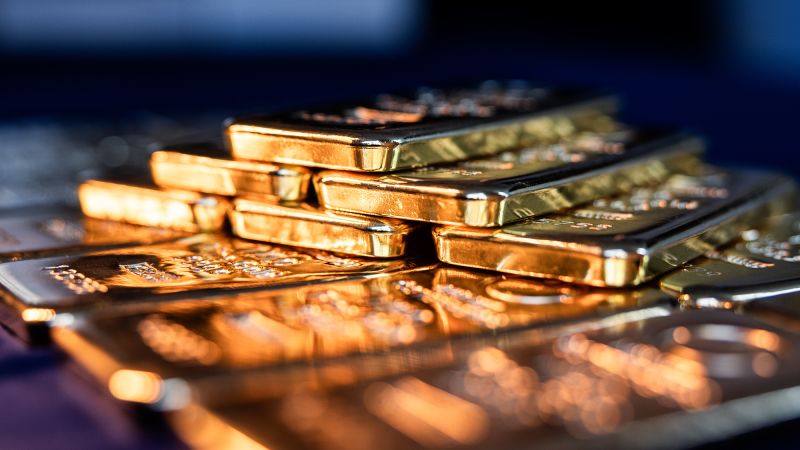Hong Kong
CNN
—
The price of gold jumped to a fresh record high on Tuesday, as concerns about US President Donald Trump’s intention to oust Federal Reserve Chair Jerome Powell weighed on investors.
Gold, considered a safer financial bet amid economic uncertainty, rose to a new record of $3,500.05 per troy ounce earlier in the day, according to Refinitiv data, and last traded at $3,479.5 per troy ounce.
Gold has risen over 31% so far this year. It’s been one of the biggest winners as Trump advances his global tariff agenda.
It’s “driven by rising demand for safe-haven assets amid declining confidence in the US dollar and escalating geopolitical and economic risk,” Rania Gule, senior market analyst at XS.com. wrote in a Tuesday research note. “In my view, this rally reflects ongoing recession fears in the US economy and heightened political tensions.”
By contrast with gold, investors have been dumping bonds. Heavy selling pressure continued during the trading session with the yield on 10-year Treasuries, a benchmark for various debt, increasing. Bond yields and prices trade inversely.
The rise in gold prices follows a widespread sell-off in the US, where all three major indexes — the Dow, the S&P 500 and the tech-heavy Nasdaq Composite — slumped on Monday.
Weeks of market turmoil sparked by Trump’s tariffs have been further fueled by his threats to fire Powell after repeated public attacks on him, sending stocks into deeper volatility over recent trading sessions. Trump has lambasted the Fed chief for not lowering interest rates.
Last week, Powell said at an event in Chicago that Trump’s tariffs were unlike anything in modern history, with the potential to stoke inflation and drag on economic growth. The stark warning highlights the fact that tariffs could complicate the Fed’s rate-cutting path.
Since then, Trump has been lashing out at Powell repeatedly on social media, vowing to fire him and calling him a “loser.” Trump’s attack on the Fed’s independence has raised concerns that investors might lose confidence in the stability of US markets.
On Tuesday, Asian shares closed mostly flat. Japan’s benchmark Nikkei 225 index ended 0.2% lower, while South Korea’s Kospi was down less than 0.1%. Hong Kong’s Hang Seng index was about 0.8% higher.
This is a developing story and will be updated.

